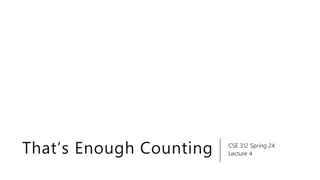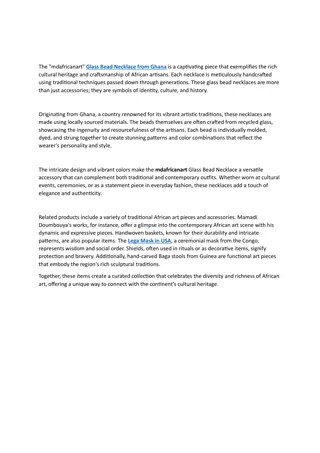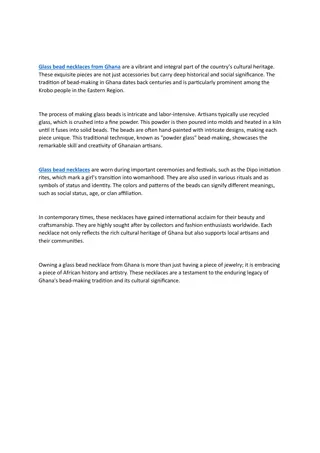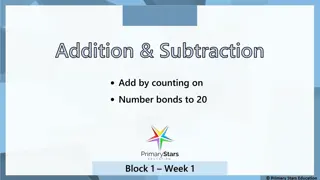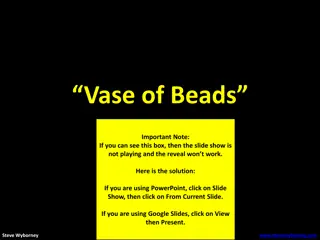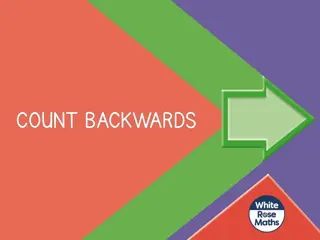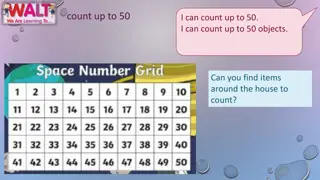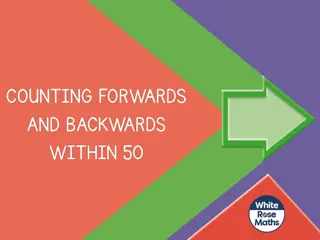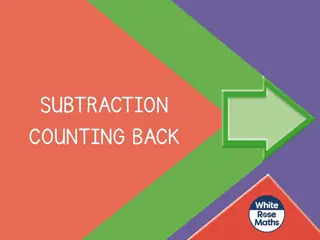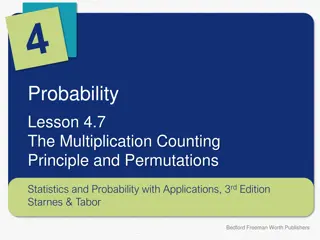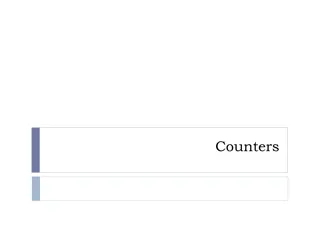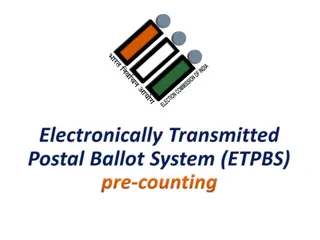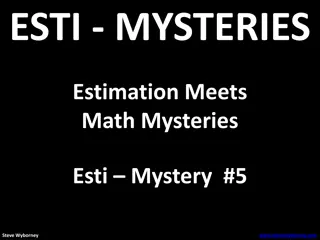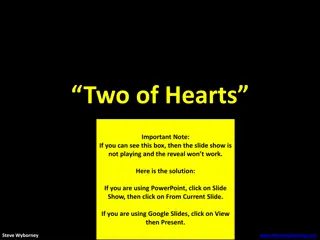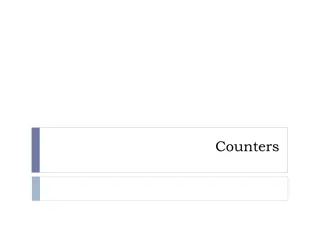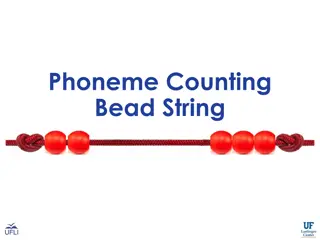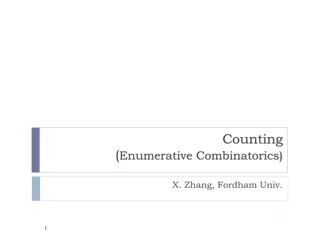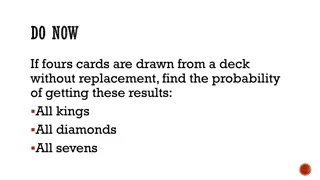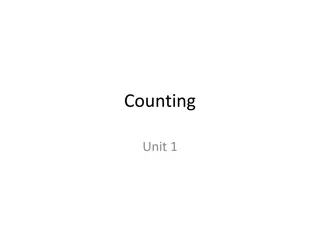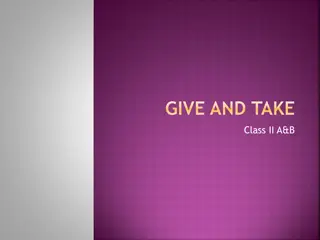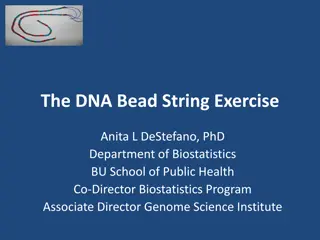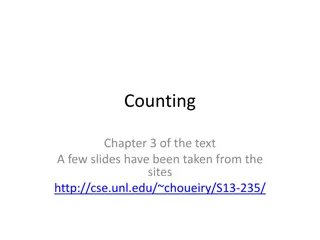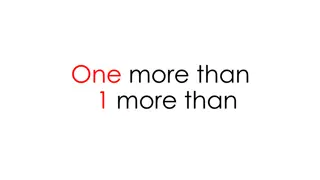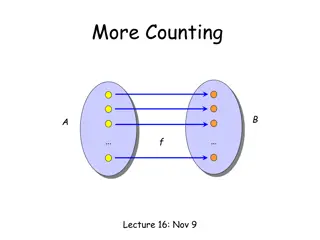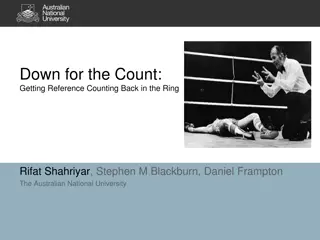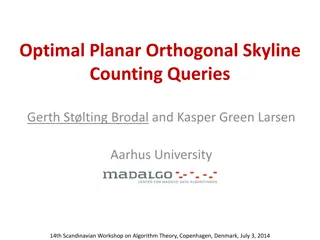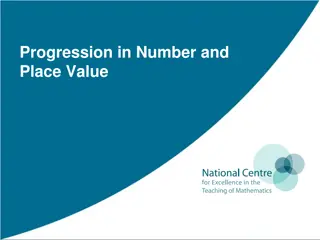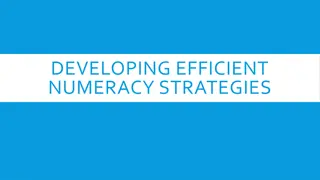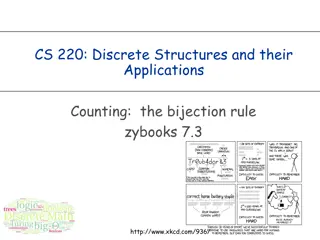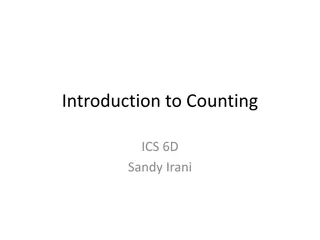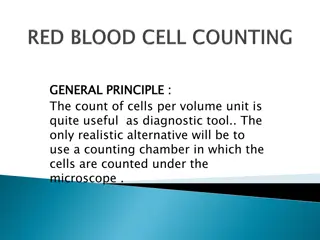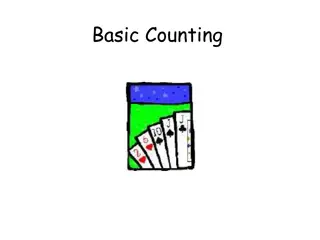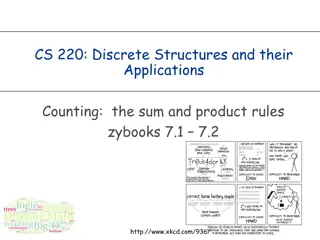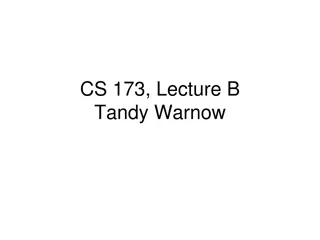Vi-CELL.BLU - Advanced Cell Counting Instrument
Vi-CELL.BLU is a cutting-edge cell counting instrument that offers faster analysis, increased resolution, and improved optical sensor technology for enhanced cell concentration and viability assessments. The device features a user-friendly interface, Trypan blue method for live cell detection, and a
1 views • 19 slides
Discover Stunning Silver Bead Earrings and a Chanel Camellia Pearl Necklace at Dovis Jewelry
Dovis Jewelry offers stunning silver bead earrings and a Chanel Camellia pearl necklace to enhance your elegance. Our refined and classic assortment is handcrafted with care, making you stand out on every occasion. https:\/\/dovisjewelry.com\/products\/isolde-sterling-silver-bead-earrings
21 views • 3 slides
Understanding Counting Methods in Probability
This content provides an overview of counting methods for computing probabilities, including combinations and permutations with or without replacement. It explains concepts like permutation with replacement using examples, such as finding possible combinations of letters with repetition allowed. The
0 views • 30 slides
Counting Principles and Pigeonhole Principle Explained
Explore the concepts of counting principles and the pigeonhole principle through practical examples and tips. Learn how to apply these principles to solve problems effectively. From understanding basic counting rules to the advanced pigeonhole principle, this content provides insights and guidance o
1 views • 35 slides
Glass Bead Necklace from Ghana
This ceremonial beaded bracelet from South Africa is a vibrant example of African artistry and cultural expression. Crafted meticulously by skilled artisans, the bracelet features intricate patterns using colorful glass beads, reflecting the traditional Zulu or Ndebele beadwork styles. Beadwork in S
2 views • 1 slides
Glass bead necklaces
The Baga Stool from Guinea is a traditional, hand-carved wooden seat used by the Baga people. Known for its intricate designs and cultural significance, this stool often features geometric patterns and symbolic carvings. It serves both functional and ceremonial purposes, reflecting the rich artistry
1 views • 1 slides
Addition and Subtraction: Counting On Number Bonds to 20 - Block 1 Week 1
In this lesson, students practice addition and subtraction by counting on using number bonds to 20. They learn to add by counting on and solve simple word problems involving adding and subtracting numbers. The lesson includes visual aids and reasoning exercises to reinforce understanding.
0 views • 7 slides
Fun Bead Vase Math Activity: Guess the Number of Beads!
Engage in a challenging math activity where you guess the number of beads in a vase by following a series of clues and using estimation. The clues provide hints such as counting by 5s, avoiding certain digits, and more, helping you narrow down the possibilities. Test your estimation skills and see i
0 views • 15 slides
Counting and Number Recognition Activities
Engage in a variety of counting and number recognition activities, including identifying numbers, counting backwards, and identifying missing numbers on number tracks. These fun exercises encourage children to practice their counting skills and improve their number recognition abilities.
0 views • 13 slides
Fun Counting Activities for Kids at Home
Engage your child in interactive counting activities using everyday items found around the house. Practice counting up to 50 objects, listen and count as counters are dropped into a jar, and create whole-part models based on different scores. Keep learning fun and educational with these entertaining
0 views • 4 slides
Math Worksheet for Counting Practice
Engage in counting exercises with visual aids such as number tracks, spotting mistakes, and identifying missing numbers. Enhance counting skills forwards and backwards. Practice identifying numbers before and after given ones through interactive tasks.
0 views • 17 slides
Counting and Subtraction Activities for Elementary Math Practice
Engage in a variety of counting and subtraction exercises with visual aids such as number tracks and number lines to enhance elementary math skills. Practice counting back, subtracting numbers, and solving simple equations through hands-on activities. Strengthen your mathematical abilities with thes
0 views • 12 slides
Understanding the Multiplication Counting Principle in Probability
The Multiplication Counting Principle and Permutations play a crucial role in determining the number of possible outcomes in various processes. This lesson covers how to use factorials to count permutations, compute arrangements of individuals, and apply the multiplication counting principle to dete
0 views • 14 slides
Understanding Counters in Sequential Circuits
Counters in sequential circuits are crucial components used for counting clock cycles and measuring time intervals. They are composed of flip-flops that progress through a sequence of states based on clock pulses. This sequential circuit has no inputs other than the clock pulse and relies on its int
1 views • 22 slides
Electoral Ballot Pre-Counting Procedures
Learn the detailed steps involved in the pre-counting process of electoral ballots, including scanning forms, verifying documents, and handling discrepancies using QR code technology. Follow along to ensure accurate counting and validation of service voter documents. Get insights into the systematic
6 views • 18 slides
Esti Mysteries: Bead Jar Estimation Challenge
Challenge your estimation skills with the Bead Jar Estimation Mystery #5 presented by Steve Wyborney. By analyzing clues such as the digits, odd number status, and divisibility hints, deduce the correct answer from the given set of possibilities. Sharpen your math intuition and logical thinking to s
0 views • 6 slides
Fun Bead Esti-Mystery Challenge
Join in the bead estimation challenge and solve the mystery of how many beads are there in total. Follow the clues provided and use your estimation skills to narrow down the possibilities. In the end, reveal the answer to the total number of beads and see if your final estimate matches the correct c
0 views • 6 slides
Understanding Sequential Counters in Digital Circuits
Sequential counters, comprised of flip-flops, are essential in digital circuits for counting clock cycles. They advance through states based on clock pulses and can measure time intervals. The circuit's output state solely depends on its present state, with transitions occurring at each clock pulse.
0 views • 22 slides
Phoneme Counting Bead String Activity
Engage students in segmenting and counting phonemes in words using a model with beads. Guide students to move a bead for each sound they hear, promoting phonemic awareness. Students can control the movement themselves if able, enhancing remote learning experiences.
0 views • 8 slides
Alaska Child Nutrition Program: Meal Counting & Claiming Systems
Explore the Alaska Child Nutrition Program's guidelines on acceptable point of service counting and claiming systems, along with eligibility documentation, meal counts, and reimbursement procedures. Learn about acceptable meal counting systems and the importance of maintaining accurate records for f
1 views • 37 slides
Counting Strategies and Examples in Enumerative Combinatorics
Understanding counting principles in enumerative combinatorics is essential for solving mathematical problems involving permutations and combinations. The concepts discussed include calculating probabilities, determining the number of outcomes, and applying counting rules to various scenarios such a
1 views • 69 slides
Understanding Counting Rules and Probability in Mathematics
The content delves into fundamental counting rules such as the Fundamental Counting Rule, Permutation Rule, and Combination Rule to help determine the number of possible outcomes for sequences of events. Factorial notation and permutations are also explained, along with examples to illustrate their
0 views • 24 slides
Understanding Counting Principles Through Fun Activities
Explore the concept of counting through various activities like coin flips, sandwich making, and golf orderings. Learn how to use tree diagrams for counting different outcomes and understand the multiplication principle to calculate total possible combinations. Engage with engaging examples like fli
0 views • 22 slides
Math Problem Solving: Bead Counting in Class II A&B
Solve a series of math problems involving counting beads taken by students in Class II A&B. Find the total number of beads taken by different pairs of students and determine the differences in bead counts between various students.
0 views • 10 slides
Innovative DNA Bead String Exercise for Biostatistics Learning
Explore the hands-on DNA Bead String Exercise designed by Dr. Anita L. DeStefano to engage students in biostatistics education. The exercise aims to bridge genetic and statistical concepts, allowing students of varying backgrounds to interact, analyze DNA, and understand key genetic elements without
0 views • 15 slides
Understanding Combinatorics and Counting in Mathematics
An exploration into combinatorics, focusing on arranging objects and counting possibilities. From dividing polygons to listing objects, delve into the world of counting and arrangement. Learn how counting plays a vital role in algorithms and probability, and discover the complexity it adds to variou
0 views • 117 slides
Fun with Numbers: Counting and Equations Exploration
Dive into a series of engaging activities involving counting from 1 to 30, counting backwards from 10 to 0, and exploring number relationships through simple equations such as "One more than 2 is 3" and "One more than 3 is…". Visualize the concepts through colorful images and enjoy learning about
0 views • 10 slides
Understanding Counting Rules and Bijection: Examples and Applications
Explore the concepts of counting rules and bijection through various examples, such as defining mappings for counting, power sets, and bijections between subsets and binary strings. Discover how to determine the number of ways to place chess pieces on a board without sharing rows or columns using ma
0 views • 49 slides
Reviving Reference Counting: A Comprehensive Analysis
Background garbage collection techniques like tracing and reference counting are crucial in managing memory in different settings. This article delves into the historical context, advantages, disadvantages, and challenges of reference counting in garbage collection. It presents an in-depth analysis
0 views • 35 slides
Advanced Techniques for Orthogonal Skyline Counting Queries
Advanced techniques for orthogonal skyline counting queries discuss optimal planar solutions, dividing and conquering for topmost point identification, efficient vertical slab counting, succinct data structures for prefix sums and range maxima, upper bounds on degree and multi-slab queries, as well
0 views • 11 slides
Exploring Number Sense and Place Value in Mathematics Education
This educational content delves into the progression of number sense and place value, focusing on key concepts such as counting in steps, addition and subtraction strategies, fluency in counting, and the development of mathematical language. It highlights the importance of fostering flexibility and
0 views • 19 slides
Developing Efficient Numeracy Strategies for Students
Students employ diverse methods to solve number problems, from basic counting to advanced arithmetic strategies. An early numeracy project, "Count Me In Too," outlined a learning framework describing the progression of students' strategies. The Emergent Counting Stage focuses on basic number skills,
0 views • 20 slides
Broadband Equity Funding Programs Overview
Overview of broadband funding streams including BEAD Program, Digital Equity Act, and IIJA initiatives aimed at promoting digital inclusion, equity, and access. Details deployment steps, fund allocation, and key dates for BEAD Program. Digital Equity Act provides grants to promote digital equity and
0 views • 7 slides
Understanding Bijection Rule in Counting Subsets and Functions
Explore the concepts of counting subsets and functions, including injective, surjective, and bijective functions. Discover the bijection rule, which states that if there is a bijection between two finite sets, their cardinalities are equal. Learn about counting palindromes and the k-to-1 rule throug
0 views • 11 slides
Introduction to Counting Techniques in Mathematics
Explore the concept of counting in mathematics using techniques like the Product Rule and Sum Rule. Learn how to calculate the number of possible choices and selections in different scenarios, such as lunch specials, student council selections, exercise schedules, and counting strings. Understand th
0 views • 15 slides
Hemacytometer Cell Counting Procedure
The hemacytometer cell counting method is a valuable diagnostic tool for determining the number of cells in a given volume of fluid. This process involves using a counting chamber under a microscope to calculate the cells per unit volume. By following a systematic approach, including proper dilution
0 views • 12 slides
Fundamentals of Counting Principles in Mathematics
In this lecture, we delve into basic rules for counting, including the sum rule, product rule, generalized product rule, permutations, combinations, binomial coefficients, and combinatorial proofs. We also explore the inclusion-exclusion principle with practical examples such as determining total en
0 views • 51 slides
Understanding Counting Principles in Discrete Structures
Counting serves a crucial role in algorithm design and complexity analysis, enabling us to determine program time and space complexities. This article explores counting principles such as the sum and product rules, Cartesian products, and their applications in solving simple and complex counting pro
0 views • 33 slides
Neighbourhood Sampling for Local Properties on Graph Streams
The research explores neighbourhood sampling for local properties on graph streams, focusing on counting subgraphs within 1-neighbourhood of a vertex. It addresses the Triangle Counting Problem and explains the significance of counting triangles in various contexts such as social network analysis an
0 views • 29 slides
Combinatorial Counting and Algorithm Design Concepts
Today's lecture covers the basics of combinatorial counting and its applications in algorithm analysis. Topics include exhaustive search strategies, determining graph properties, and various counting techniques. Techniques such as counting objects and generating subsets are discussed, along with alg
0 views • 20 slides



